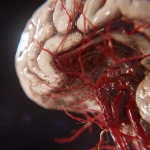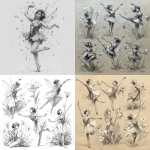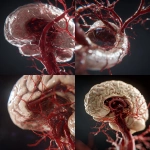Explore the Best AI Image Gallery

AI: The New Brushstrokes in the Digital Canvas
The world of graphic design is undergoing a significant transformation, driven by the rise of artificial intelligence (AI). Once confined to the realm of science fiction, AI is now a tangible force, impacting every aspect of the creative process, from ideation and design to production and marketing. This blog post delves into the multifaceted impact of AI on graphic design, exploring its potential uses, ethical considerations, and future trends.
Automating Tasks, Unleashing Creativity
AI-powered tools are rapidly automating repetitive design tasks, freeing up designers to focus on more strategic and creative endeavors. Software platforms can now generate logo variations, create social media graphics, and even design website layouts based on user input. This automation not only enhances efficiency but also empowers designers with a wider range of options and possibilities.
AI as a Creative Collaborator
Beyond automation, AI is emerging as a powerful creative collaborator. Generative adversarial networks (GANs) can produce stunning visuals, from realistic images to abstract art. These algorithms learn from massive datasets of existing designs, enabling them to generate novel and unique outputs. Designers can leverage these tools to explore new aesthetics, experiment with different styles, and push the boundaries of visual expression.
Personalization at Scale
AI is revolutionizing graphic design by enabling personalized experiences at scale. Algorithms can analyze user data, preferences, and behavior to generate customized designs that resonate with individual audiences. This level of personalization enhances engagement, strengthens brand loyalty, and creates a more meaningful connection between brands and consumers.
Ethical Considerations in AI-Driven Design
While the potential benefits of AI in graphic design are undeniable, it is crucial to address the ethical considerations associated with its use.
- Bias and Representation: AI algorithms learn from the data they are trained on, which can perpetuate existing biases and stereotypes. Designers must be mindful of this and work to ensure that AI-generated designs are inclusive and representative of diverse communities.
- Copyright and Intellectual Property: The ownership and copyright of AI-generated artwork remain a complex and evolving issue. It is essential to establish clear guidelines and regulations to protect the rights of both creators and users of AI-powered design tools.
- Transparency and Accountability: As AI becomes more sophisticated, it is important to ensure transparency in how these systems work and who is responsible for the outputs they generate. Designers should strive to make their use of AI understandable and accountable to clients and stakeholders.
The Future of AI in Graphic Design
The integration of AI into graphic design is still in its early stages, but the future holds immense possibilities. We can expect to see:
- More sophisticated AI tools: AI algorithms will continue to advance, becoming more capable of understanding complex design concepts and generating even more innovative outputs.
- Seamless human-AI collaboration: Designers and AI will work together as creative partners, leveraging the strengths of both humans and machines to produce exceptional results.
- Emergence of new design styles: AI will inspire new artistic movements and design trends, pushing the boundaries of visual expression.
- Democratization of design: AI-powered tools will empower individuals with limited design experience to create professional-quality graphics, fostering greater accessibility and creativity.
As AI continues to evolve, it has the potential to revolutionize graphic design, making it more efficient, creative, and accessible than ever before. However, it is crucial to approach this transformation responsibly, addressing the ethical considerations and ensuring that AI serves as a tool for empowerment and innovation rather than a replacement for human creativity.

](https://images.ai-img.art/thumbnails/150/aed4d771a0a5b63bed28f6e7183dd4614c5e3e3586d300c8d879ccbb37dbfb4e.webp)



](https://images.ai-img.art/thumbnails/150/cf8299cc184c859eff89d17514689e19c7994ad29256a58ad77fa0f7218e2cff.webp)


](https://images.ai-img.art/thumbnails/150/78b567a3483191dd52f3d16038b5a926e03e4066d5b301cfff023fb91a962e67.webp)












](https://images.ai-img.art/thumbnails/150/476665d1452e44d38d5b4fbf5fab4389a6131d55b7bfe8a41d7f65f66b5a9310.webp)









](https://images.ai-img.art/thumbnails/150/da89993919887fcf2c84af5ec12f2ac997ad0f67c8bf00fecd67ba06a1b3dc49.webp)
](https://images.ai-img.art/thumbnails/150/915b5e50ce61f6219cb8f764d89e2efcb8ad3a9ebd09e0670ae7dc0e2c99a8bd.webp)
















